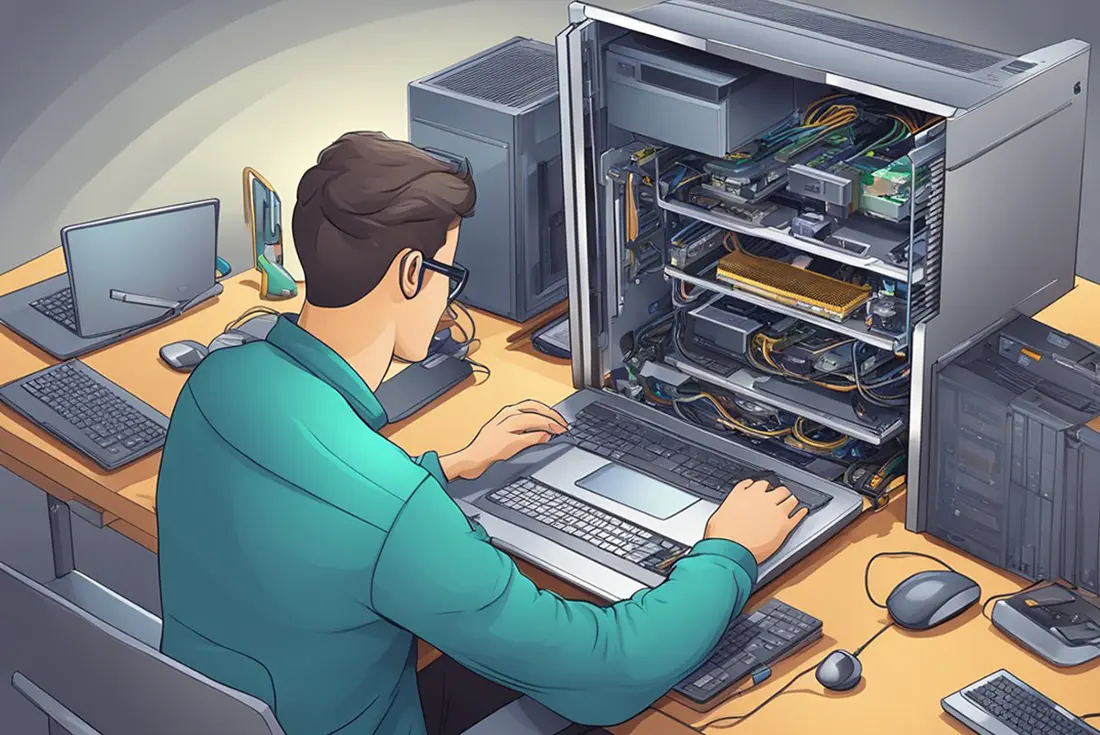
29 Jul Essential Tips for Keeping Your Computer Running Smoothly
A sluggish or malfunctioning computer can ruin your productivity and workflow. Whether it’s a frustratingly slow boot-up, frequent crashes, or inexplicable computer glitching, these issues can lead to lost time, frustration, and even potential data loss. But fear not! With a few proactive measures and regular maintenance, you can keep your computer running smoothly and avoid the need for frequent “repairing computer” searches or trips to the local PC hardware repair shop.
Let’s dive into some essential tips to help you maintain a healthy and efficient computing experience.
Keep Your Software Up to Date
Outdated software is a common culprit behind performance issues and security vulnerabilities. Regularly update your operating system, applications, and drivers to ensure you have the latest features, bug fixes, and security patches. Set your system to automatically download and install updates whenever possible. This includes not only major OS updates but also firmware updates for your BIOS or UEFI, as well as updates for critical applications like your web browser, antivirus software, and productivity suite. Keeping your software up to date ensures that you’re protected against the latest security threats and that your system is running optimally.
Declutter Your Hard Drive
A cluttered hard drive can slow down your computer significantly. As your hard drive fills up, it becomes more difficult for the system to find and access files, leading to slower read and write speeds. Regularly delete unnecessary files, such as temporary files, old downloads, and duplicate photos. Uninstall programs you no longer use to free up space and reduce the number of background processes that might be running. You can also use disk cleanup tools to identify and remove large or unnecessary files, such as system files, Windows update cleanup, and previous Windows installations. Consider upgrading to a larger or faster storage drive, such as an SSD, if your current drive is nearing capacity. SSDs offer significantly faster read and write speeds compared to traditional HDDs, leading to a noticeable improvement in overall system performance.
Optimize Your Startup
Too many programs starting up automatically when you turn on your computer can significantly impact boot-up times and overall performance. These programs compete for system resources, such as CPU and memory, slowing down your computer’s startup and affecting its responsiveness. Review your startup programs and disable any that are not essential for your daily workflow. You can manage startup programs through the Task Manager (Ctrl+Shift+Esc) or the System Configuration utility (msconfig). Be cautious when disabling startup items, as some may be necessary for your system’s proper functioning.
We bet that at this point, you realize that keeping your computer in good shape is not that easy. That is why it is best to entrust its maintenance to professionals. Downtown Computer Services is a team of highly qualified and certified specialists. We have been working with computers since 1995, and we can fix anything. If your computer bothers you, call us at (954) 524 9002 and let us put everything in order.
Protect Against Malware
Malware, such as viruses, spyware, and ransomware, can wreak havoc on your system, causing slowdowns, crashes, and even data loss. These malicious programs can consume system resources, modify system files, and steal or encrypt your data. Install a reputable antivirus and anti-malware software and keep it updated. Choose a solution that offers real-time protection, regular scans, and automatic updates to ensure you’re protected against the latest threats. Avoid clicking on suspicious links or downloading files from untrusted sources, as these are common ways for malware to infiltrate your system. Be wary of emails from unknown senders or with unexpected attachments, and always verify the legitimacy of a website before downloading anything.
Keep Your System Cool
Overheating can lead to performance issues, system instability, and even hardware damage. When your computer’s internal components get too hot, they can throttle their performance to prevent damage, leading to slowdowns and sluggishness. In extreme cases, overheating can cause permanent damage to your CPU, GPU, or other critical components. Ensure your computer has adequate ventilation and that its fans are functioning correctly. Regularly clean the vents and fans to prevent dust buildup, which can impede airflow and cause overheating. Consider using a can of compressed air to blow out dust from the vents and fans, and make sure your computer is placed in a well-ventilated area. If you’re comfortable doing so, you can also open up your computer case and clean the internal components with compressed air.
Check for Hardware Issues
Sometimes, a computer glitching or slowdown may be caused by a hardware problem. Pay attention to any unusual noises, such as grinding or clicking from your hard drive, or excessive fan noise, which could indicate overheating. Also, keep an eye out for error messages or blue screens of death (BSODs), which can often point to hardware failures. If you suspect a hardware issue, consider seeking professional PC hardware repair services to diagnose and resolve the problem. A qualified technician can run diagnostic tests to identify faulty components and recommend appropriate repairs or replacements.
Defragment Your Hard Drive (HDDs only)
Fragmentation occurs when files are broken up into small pieces and scattered across your hard drive. This can slow down your hard drive by increasing the time it takes to read and write data. If you’re using a traditional hard disk drive (HDD), defragment it regularly to improve performance. You can use the built-in Disk Defragmenter tool in Windows or a third-party defragmentation software. However, if you’re using a solid-state drive (SSD), defragmentation is not necessary and can even reduce the lifespan of the drive.
Use Cloud Storage
Storing your files in the cloud can free up space on your hard drive and improve performance. By offloading large files and data to the cloud, you can reduce the amount of data your hard drive needs to manage, leading to faster access times and improved overall performance. Cloud storage also provides an additional layer of data protection in case of a hardware failure or other disaster. Popular cloud storage providers include Dropbox, Google Drive, and OneDrive.
Regularly Restart Your Computer
Restarting your computer clears the memory and closes any background processes that may be hogging resources. Over time, as you open and close applications, your computer’s memory can become fragmented, and background processes can accumulate, leading to performance degradation. Make it a habit to restart your computer at least once a day to maintain optimal performance. You can also use the Task Manager (Ctrl+Shift+Esc) to identify and close any unnecessary or resource-intensive processes that might be running in the background.
Consider Professional Maintenance
If you’re not comfortable performing these maintenance tasks yourself, or if you’re experiencing persistent issues, consider engaging a professional repairing computer service. They can perform a thorough system checkup, diagnose and resolve any problems, and provide expert advice on how to keep your computer running smoothly. Professional technicians have the tools and expertise to identify and fix complex issues that might be beyond the scope of DIY repairs. They can also perform preventive maintenance tasks, such as cleaning internal components, optimizing system settings, and updating drivers, to help prevent future problems and ensure your computer’s longevity.
Conclusion
Maintaining a healthy computer isn’t just about fixing problems as they arise; it’s about proactively taking steps to prevent issues before they occur. By keeping your software up-to-date, decluttering your hard drive, optimizing your startup, protecting against malware, keeping your system cool, and performing regular maintenance, you can ensure your computer operates at its peak performance.
However, even with the best intentions, some computer issues may be beyond the scope of a DIY fix. If you find yourself facing persistent problems or require expert assistance, don’t hesitate to seek professional help. Need to resolve persistent computer glitches or do you require expert PC hardware repair? Contact Downtown Computer Services today at (954) 524 9002. Our team of skilled technicians in Fort Lauderdale can diagnose and fix any computer issue, ensuring your system runs smoothly and efficiently.
Key Takeaways
- Regular software updates, hard drive decluttering, and startup optimization are crucial for maintaining optimal computer performance.
- Protecting against malware, keeping your system cool, and checking for hardware issues can help prevent computer glitches and costly repairs.
- If you encounter persistent issues or need expert assistance, consider professional PC repair services to diagnose and resolve complex problems efficiently.
Check out other relevant news
- How Easy-to-Use Hacking Tools Are Fueling Cybercrime
- Cryptocurrency Security for Small Businesses: Protecting Your Wallet
- The Infostealer Epidemic: Protecting Your Business from the Latest Wave of Cyberattacks
- The Identity Crisis: How Compromised Credentials Can Cripple Your Business
- Beyond the Brick and Mortar: Building Your Online Storefront with Digital Marketing
